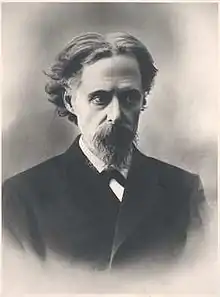August Rauber
August Rauber (March 9, 1841 – February 16, 1917) was a German anatomist and embryologist born in Obermoschel in the Rhineland-Palatinate.

Rauber was born the fourth of five children to Stephan Rauber and Rosalie née Oberlé.[1] He studied medicine in Munich, obtaining his doctorate in 1865. At Munich his instructors included Theodor Bischoff (1807–1882), Nicolaus Rüdinger (1832–1896) and Julius Kollmann (1834–1918).[2]
Career
In 1869 he obtained his habilitation, and in 1872 worked as a dissector at the University of Basel. Shortly afterwards, he relocated to the University of Leipzig, where he worked under Wilhelm His (1831–1904). From 1873 to 1886 he was an associate professor of anatomy and anthropology at Leipzig.[2]
In 1886, he became a professor of anatomy and head of the anatomical institute at the University of Dorpat.[2] He worked as a professor in Tartu (Dorpat) for 25 years and also started the anatomy collection of the University of Tartu.
In his studies involving the embryonic development of birds and mammals, Rauber is credited with combining comparative embryology and histology with phylogenetic analysis.[3] The eponymous "Rauber's layer" bears his name, being defined as a trophoblastic membrane over the embryonic disk in developing animals.[4]
He is buried to the New St. John's Cemetery in Tartu.
Partial list of publications
- Vater'sche Körperchen der Bänder- und Periostnerven und ihre Beziehung zum sog. Muskelsinne (1865).
- Untersuchungen über das Vorkommen und die Bedeutung der Vaterschen Körperchen (1867).
- Elasticität und Festigkeit der Knochen, 1876 - Elasticity and strength of bones.
- Über den Ursprung der Milch und die Ernährung der Frucht im Allgemeinen (1879).
- Urgeschichte der Menschen, (two volumes) 1884 - Prehistory of man.
- Homo sapiens ferus (1885) - Homo sapiens ferus.
- Oder die Zustände der Verwilderten und ihre Bedeutung für Wissenschaft, Politik und Schule (1885).
- Über die Bedeutung der wissenschaftlichen Anatomie, 1886 - On the importance of scientific anatomy.
- Atlas der Krystallregeneration (four volumes), 1896/97 - Atlas of "crystal regeneration".
- Die Aufgaben des Lebens (1896).
- Lehrbuch der Anatomie des Menschen (two volumes) - Textbook of human anatomy - (5th edition 1897/98), continued by Friedrich Wilhelm Kopsch (1868-1955).[5][6]
Bibliography
- Maie Toomsalu, The Legend is Alive: August Antonius Rauber, Professor of Anatomy, University of Tartu, Tartu 2020, pp. 183
References
- Kogerman-Lepp, E (February 1992). "August Rauber". Ann. Anat. 174 (1): 6–10. doi:10.1016/s0940-9602(11)80333-x. PMID 1605361.
- Drw.saw-leipzig.de (biography)
- Brauckmann, Sabine (2006). "August Rauber (1841-1917): From the primitive streak to Cellularmechanik". The International Journal of Developmental Biology. 50 (5): 439–49. doi:10.1387/ijdb.052127sb. PMID 16586344.
- Mondofacto Dictionary Definition of eponym
- Open Library Rauber's Lehrbuch der Anatomie des Menschen
- Google Books Rauber-Kopsch Lehrbuch und Atlas der Anatomie des Menschen: Eingewiede Nervensystem Sinnersorgane
External links
- Works by or about August Rauber at Internet Archive
- Translated biography and list of publications @ Pagel: Biographical Encyclopedia